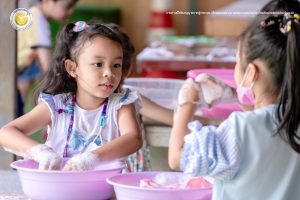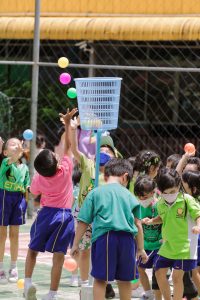
ระดับอนุบาล
School concept: วรพัฒน์นวสิกขาอนุบาลศึกษา เพื่อความเจริญงอกงามมี “รากฐานชีวิตที่ดี”
โดยรากฐานชีวิตที่ดีในเด็กปฐมวัยนั้น ประกอบไปด้วยผลลัพธ์ทางการศึกษา ๕ ด้าน ดังนี้
School Concept: Warraphat Navasikkha Kindergarten, “Foundation for a Good Life”
The cornerstone of a fulfilling life in early childhood encompasses educational outcomes in five key areas:
๑. Holistic Development พัฒนาการแบบองค์รวม
เด็กได้รับการพัฒนาและมีสมรรถนะรอบด้านเหมาะสมตามวัย มีสมรรถนะ ๗ ประการ (UNICEF, 2561) ดังนี้
- ๑.๑ พัฒนาการเคลื่อนไหวและสุขภาวะทางกาย (Physical Well-Being and Motor Development)

- ๑.๒ พัฒนาการด้านสังคม (Social Development)
- ๑.๓ พัฒนาการด้านอารมณ์ (Emotional Development)
- ๑.๔ พัฒนาการด้านการคิดและสติปัญญา (Cognitive Development)
- ๑.๕ พัฒนาการด้านภาษา (Language Development)
- ๑.๖ พัฒนาการด้านจริยธรรม (Moral Development)
- ๑.๗ พัฒนาการด้านการสร้างสรรค์ (Creative Development)
Holistic Development
Holistic development ensures children acquire age-appropriate competencies across seven key areas (UNICEF, 2018):
1. Physical Well-Being and Motor Development
2. Social Development
3. Emotional Development
4. Cognitive Development
5. Language Development
6. Moral Development
7. Creative Development
๒. Senses ละเอียดว่องไว
เด็กได้รับการพัฒนาสัมผัสทั้ง ๗ ด้าน (Anna Jean Ayres, 1989) ได้แก่ การมองเห็น (Sight) การได้ยินเสียง (Hearing) การรับรส (Taste) การได้กลิ่น (Smell) การสัมผัส (Touch) การเคลื่อนไหวและการทรงตัว (Vestibular) และการรับรู้ผ่านกล้ามเนื้อ (Proprioception)
Development of Senses
Children undergo development across all seven senses, as outlined by Anna Jean Ayres in 1989:
Sight, Hearing, Taste, Smell, Touch, Vestibular, and Proprioception
๓. EF แข็งแรง
เด็กได้รับการพัฒนาทักษะสมองเพื่อชีวิตที่สำเร็จ (Executive Functions หรือ EF) สมองส่วนหน้าควบคุมความคิดและการกระทำ มีองค์ประกอบพื้นฐาน ๓ กลุ่มทักษะ (วิเชียร ไชยบัง, ๒๕๖๒) ดังนี้
- ๓.๑ กลุ่มทักษะพื้นฐาน
- ๓.๑.๑ Working Memory ความจำที่นำมาใช้งาน หรือความสามารถในการนำข้อมูล ความจำ ในสมองมาใช้งานตามสถานการณ์
- ๓.๑.๒ Inhibitory Control ความสามารถในการยั้งคิด ไตร่ตรอง ควบคุมความต้องการ คิดก่อนทำหรือคิดก่อนพูด
- ๓.๑.๓ Shifting/ Cognitive Flexibility ความสามารถในการปรับตัว พลิกแพลง การยืดหยุ่น หรือความคิดสร้างสรรค์
๓.๒ กลุ่มทักษะกำกับตนเอง
- ๓.๒.๑ Focus Attention ความสามารถในการจดจ่อกับสิ่งที่ทำ ไม่วอกแวก
- ๓.๒.๒ Emotional Control ความสามารถในการควบคุมอารมณ์ ไม่โกรธง่าย ไม่หงุดหงิดง่าย
- ๓.๒.๓ Self-Monitoring การประเมินผลการทำงานของตนเอง หาจุดบกพร่อง และพัฒนาให้ดีขึ้น
- ๓.๓ กลุ่มทักษะปฏิบัติ
- ๓.๓.๑ Initiating ความสามารถในการลงมือทำ ไม่ผัดวันประกันพรุ่ง
- ๓.๓.๒ Planning and Organizing ความสามารถในการวางแผน ลำดับความสำคัญ การกำหนดเป้าหมาย และการประเมินผล
- ๓.๓.๓ Goal-Directed Persistence ความพากเพียรให้บรรลุเป้าหมาย
Developing Executive Functions (EF)
Children acquire crucial brain skills essential for a successful life, known as Executive Functions (EF), primarily controlled by the brain’s frontal lobes. These skills, outlined by Wichian Chaiyabang in 2019, encompass three fundamental groups:
1. Basic Skills Group
– Working Memory: The ability to utilize and manipulate information stored in the brain according to the given situation.
Inhibitory Control is the capacity to pause, reflect, and manage impulses, ensuring thoughtful actions or speech.
– Shifting/Cognitive Flexibility: The aptitude to adapt, innovate, and embrace change.
2. Self-Regulatory Skills Group
– Focus Attention: The capability to concentrate on tasks without distractions.
– Emotional Control: The skill to regulate emotions, fostering resilience and reducing susceptibility to anger or frustration.
Self-monitoring is the ability to assess one’s own performance, identify areas for improvement, and make necessary adjustments.
3. Practical Skills Group
– Initiating Action: The propensity to take initiative and avoid procrastination.
– Planning and Organizing: The capacity to strategize, prioritize tasks, and evaluate progress towards goals.
– Goal-directed persistence: Determining and persevering to pursue objectives despite obstacles or setbacks.
๔. Self’s แข็งแกร่ง
- ๔.๑ Self-Esteem ภูมิใจในตนเอง สร้างสนามพลังบวกให้เด็กมีความภาคภูมิใจในตนเอง (Green)
- ๔.๒ Self-Control กำกับตัวเอง เด็กมีสติ สามารถควบคุมตนเองได้ (เป็นทักษะหนึ่งที่อยู่ใน EF)

- ๔.๓ Self-Concept นำตนเองเกิดปัญญา เด็กเรียนรู้ด้วยตนเองจากประสบการณ์และการเรียนรู้จนเกิดวิธีคิดของตนเอง (Active) รวมถึงการมีความคิดหรือมุมมองที่มีต่อตนเองนำไปสู่การแสดงพฤติกรรมโดยได้รับอิทธิพลมาจากการได้รับการยอมรับจากสังคมและปฏิสัมพันธ์จากคนรอบข้าง (William James, 1890)
Building Strong Self
4.1 Self-Esteem: Fostering pride and confidence in oneself to cultivate a positive self-image, creating an environment conducive to self-esteem (Green).
4.2 Self-Control: Cultivating self-directed behavior where children are aware and capable of managing their impulses, a critical skill within Executive Functions (EF).
4.3 Self-Concept: This involves encouraging self-awareness and self-understanding through experiential learning, allowing children to develop their unique perspectives and ways of thinking (Active). This process includes forming thoughts or beliefs about oneself, influencing behavior based on societal acceptance, and interacting with others (William James, 1890).
๕. Trilingual คล่องแคล่วสมวัย
มีความรู้ ความสามารถใช้ภาษาไทย ภาษาอังกฤษ และภาษาจีนในการสื่อสาร อีกทั้งมีความเข้าใจความหลากหลายทางวัฒนธรรม
Trilingual Proficiency
Children possess the agility and aptitude to effectively communicate in three languages—Thai, English, and Chinese—appropriate for their age. This proficiency extends beyond linguistic capability to include understanding cultural diversity, allowing for nuanced interactions and communication across diverse cultural contexts.
